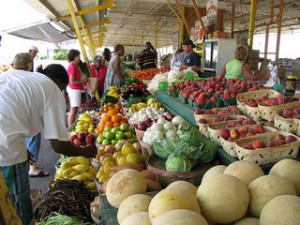Farmers’ Markets as a Means of Education and Community Growth
According to Stoyan, large chains are beginning to change their practices because they understand people are caring more about where their foods are coming from. “Farmers’ markets will be a threat to the bigger grocery stores if people start avoiding shopping at Loblaws, Costco, that sort of thing.” On top of that, markets are great for the city, as they reach out to people, put parks to use and boost city morale as well as impact the tourist economy.
[pullquote]The idea of the local food movement is to educate the co-producer around the consequences of an industrial food system. And so, farmers’ markets are one of the components that brings people together.[/pullquote]
Marina Queriolo, manager of Evergreen Brick Works Farmers’ Market, advises that people want to support local economy and now understand the implication of bad food choices. Queriolo says that people aren’t finding what they need from mainstream sources and so they are turning to farmers’ markets where they can talk to vendors and build a relationship.
“The idea of the local food movement is to educate the co-producer [people buying at markets] around the consequences of an industrial food system. And so, farmers’ markets are one of the components that brings people together, that connects them to food, and it’s an easy way, it’s not something that you have to do a lot of homework for, you just show up to the market and somebody has done the screening for you,” Queriolo explains. “There is an understanding that if you choose the right market, that it is local farmer, the practices are sustainable … it’s a good place to find food without being intimidated.”
Queriolo agrees that certain areas in the city could improve their food access and there are opportunities for them to develop new farmers’ markets, but she made a strong point in saying that, “we need to ensure that the farmers that are coming to the city are really making enough money for them to come here. So it’s a difficult balance in saying yes, let’s have more farmers’ markets because that makes more producers in contact with the co-producers (customers), but we need to make sure it makes financial sense for the farmers to be driving this distance to get to the market.”
“What I think needs to happen now, is that we need to be strategic about what farmers’ markets are growing in the city and where we need to expand markets,” Queriolo explains, “there’s still a disconnect in small towns about the value of food.”
Jackie Marchildon recently graduated with her degree in journalism from Ryerson University. After spending a semester abroad, Jackie has avid travel plans and enjoys writing about almost everything, from human rights issues to arts and entertainment. For examples of her recent pieces, visit: http://www.linkedin.com/pub/jackie-marchildon/59/b84/131.
Photograph Courtesy of Robert S. Donovan
Photograph Courtesy of Natalie Maynor
































Share the post "Farmers’ Markets as a Means of Education and Community Growth"